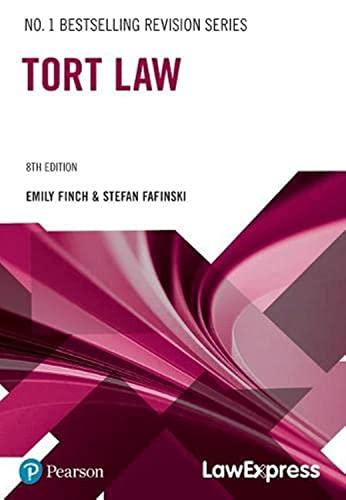Question
Question: Sid Slick represents himself as Richard Rich to Ortie Ozarka. Ortie, believing that Sid was really Richard, gave Sid a check payable to Richard's
Question:
Sid Slick represents himself as Richard Rich to Ortie Ozarka. Ortie, believing that Sid was really Richard, gave Sid a check payable to Richard's order. Sid endorses the instrument "pay to Art Arbuckle" and gave it to Art. Art gives it to Harry. Is Harry a proper holder of the instrument?
Chapter 28 Overview:
This chapter involves the second of three steps necessary to change the common law rule of assignments in regards to commercial paper. The first step was that the instrument had to be negotiable. The second step requires that the instrument be properly transferred (negotiated). UCC 3-201 is the basic section for negotiation. Subsection (b) provides two rules for proper negotiation. If the instrument is "order" paper, it must be negotiated by endorsement and delivery. If it is "bearer" paper, it can be negotiated by delivery alone. Since almost all instruments (both checks and notes) are pre-printed with "pay to the order of ...", most instruments will require an endorsement for proper negotiation. If an endorsement says "Payable to Art", it must be endorsed to transfer it to Harry.
There are three main types of endorsements. 3-205 sets forth two types and 3-206 sets out the third. Probably, the one most people are familiar with is the "blank" endorsement. The blank endorsement usually consists of only a signature. When it is used, it changes what was an order instrument on its face to a bearer instrument. A "special" endorsement specifies a payee in the endorsement. This continues to be order paper. The third type of endorsement is a "restrictive" endorsement. The primary example of this is "For Deposit Only". One who takes this instrument and does not apply the proceeds consistent with the endorsement is liable for conversion.
Each of the three main types of endorsements can be either "qualified" or "unqualified". If nothing is said, they are unqualified. 3-415(a) provides that anyone who endorses an instrument becomes secondarily liable on the instrument. 3-415(b) says one can limit that liability by endorsing "without recourse". These would become qualified endorsements but financial institutions will usually not take them, so most endorsements are unqualified.
3-416 provides that if an instrument is endorsed, the transferee makes certain warranties to anyone who takes the instrument. Among the most important of these is that there are no defenses and that all signatures are genuine and authorized. These are similar to the warranties that an assignor makes with an ordinary contractual assignment, except they were saying the right was valid as opposed to warranting signatures. These warranties become important particularly when dealing with forged endorsements. Typically, a forged endorsement has no effect (3-403(a)) and the person who took the instrument could recover from the transferor under warranty theory. However, there are two big exceptions to the rule that forged endorsements are not effective. The exceptions are found in 3-404. Instruments made payable to imposters and fictitious payees, may be effectively endorsed by any person in the name of the named payee. This is to protect innocent endorsers from the negligence of drawers of the checks who did not have good internal controls.
Step by Step Solution
There are 3 Steps involved in it
Step: 1

Get Instant Access to Expert-Tailored Solutions
See step-by-step solutions with expert insights and AI powered tools for academic success
Step: 2

Step: 3

Ace Your Homework with AI
Get the answers you need in no time with our AI-driven, step-by-step assistance
Get Started


